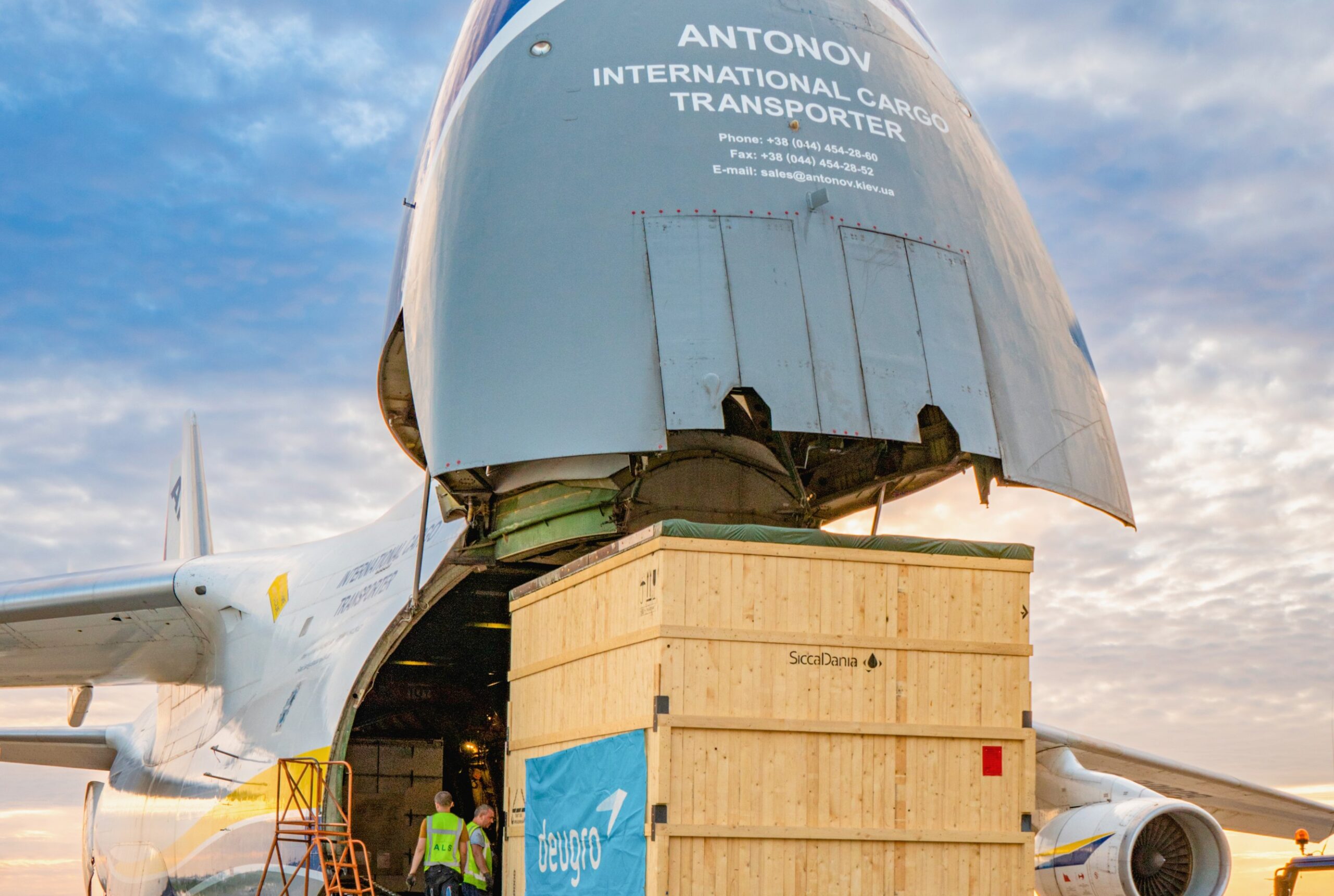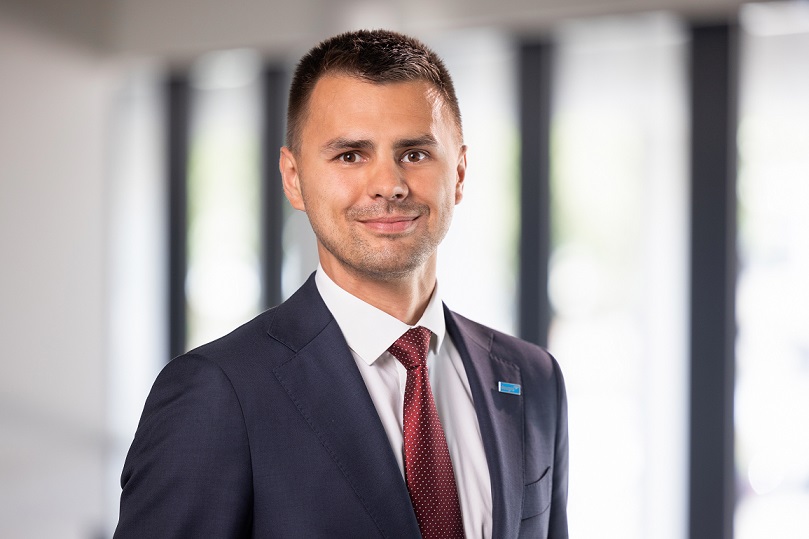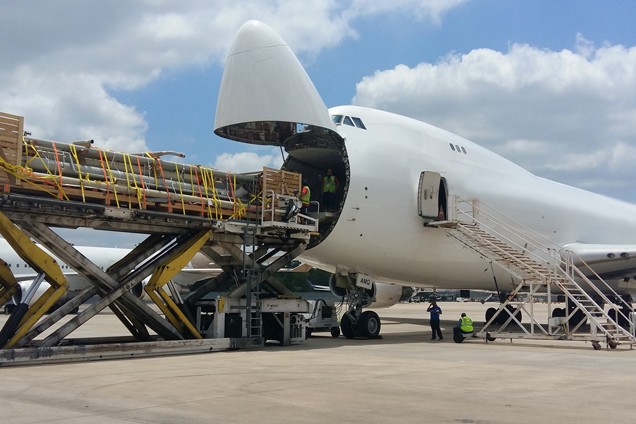All change for energy airfreight
05 / 06 / 2023

deugro loading operation at Ostend Bruges Airport in Belgium. Photo: deugro
Reduced heavylift capacity, costs and shifts in the oil market have forced the air charter market to think outside the box, but new opportunities are emerging in the energy airfreight sector.
The reduction in heavylift airfreight capacity since the invasion of Ukraine is prompting manufacturers in the energy sector to consider changes in the production process.
“If the pieces we need to move are smaller, then the options we can offer are much greater,” says Pavel Kuznetsov, head of air chartering, deugro. And the sooner that the Frankfurt-based specialist in worldwide forwarding and project logistics can be included, the better.
“We want to get involved with manufacturers as early as possible – ideally at the design stage – as that will give the highest possibility for cost reductions if airfreight is needed.”
He admits that airfreight is not the first choice in most circumstances. “Everyone tries to avoid airfreight because of the cost, but we all know that there are times that they might have to do it, so it is best to be prepared.”
deugro has a sister company within the deugro group, dteq Transport Engineering Solutions GmbH, which it works with to develop specialist solutions.
“You need strong in-house engineering expertise, which is one reason that clients choose us,” says Kuznetsov.
“We are seeing a number of clients while they are still in the early stages of new equipment design to explore possible ways of optimising production in case there is a need to move by air. We have to prepare to move these goods by air with the lowest cost.”
And there are possibilities even further along in the production line. “Maybe they can dismantle certain parts to enable it to move by scheduled freighter rather than paying millions for a heavylift aircraft.”

Pavel Kuznetsov, head of air chartering, deugro. Photo: deugro
Smart size shipments
The destruction of the Antonov AN-225 ‘Mriya’ aircraft at the beginning of Russia’s invasion of Ukraine means that its unique capacity is no longer available. And the reduction in the availability of the Antonov 124s has further increased pressure on managing heavylift movements.
Dan Morgan-Evans, group cargo director, Air Charter Service (ACS), says: “If we are working on something that needs an Antonov, we highlight to the customer the need to come to us as early as possible.
“The fleet is restricted considerably. It’s tough to get hold of an Antonov at short notice, but they are still flying and doing commercial business. We have done quite a few 124s this year.”
He says that the more time ACS has, the more likely it can come up with the best solution to move the piece.
“We look at what they have and think smart about building it in a specific way so that, for instance, we can get it on a 747 – maybe dismantling some equipment to fit through the door, ensuring the correct weight spread, keeping everything secure.”
Reto Hunziker, chief executive Europe of global aircraft charter specialists Chapman Freeborn, says that with the available capacity, “chartering an aircraft is a last resort now” and energy companies are finding other ways of shipping.
“For instance, they are trying to reduce the size of the equipment so they can get it on commercial aircraft like B747 or 777 freighters. They are trying to pack the cargo in a way that it is loadable on them.
“They look at other industries as well where packaging is done differently to make better use of transportation space. In the end, it is all about saving money.”
He says that air charter will always be a niche market. “It is used if the shipment cannot be done with commercial aircraft or sea freight. It is needed if something becomes super-urgent or has a special origin or destination, but it is difficult to become first choice.”
The war in Ukraine and sanctions against Russia have forced energy companies, like many companies in other sectors, to change some aspects of their operations.
Hunziker says that while oil supplies from Russia are down, there are opportunities in other parts of the world, often with better long-term prospects.
“The whole supply will change – there will be new opportunities for our industries, going to new places, changing origins and destinations.”
He identifies Africa, especially, as an expanding market. “Before Covid it was growing, then there was a dip, but it is starting to pick up again.”

Photo: Chapman Freeborn
Prices define demand
Of course, in the energy sector, the market is heavily reliant on the price of oil, with higher prices making airfreight and chartering specialist aircraft more viable.
Morgan-Evans says that “when the price is high, we get a lot of business as companies want to get oil out of the ground.”
He says ACS is receiving more enquiries than it used to. “People are coming to ask for quotations – they are weighing up their options as to what air charter would look like. There are more questions about planned work coming our way, mostly with forwarders. It does not always become business, but more are asking.”
Kuznetsov agrees that there is a correlation between demand for services and price of energy. “On the other hand, deugro has observed quite a steady demand for airfreight solutions over the years in the energy vertical. Energy consumption is still growing overall despite a bit of a dip caused by the pandemic.”
He admits: “Sourcing the right aircraft at the right time is much more challenging now as the current pool of heavy-ramp aircraft is very limited. Also, the price level is increasing. Solutions are harder to get and are also less affordable for clients.”
However, it is not all bad news. “The 747 freighter market is a big help for project cargo. There are a number of carriers specialising in heavylift and oversize cargo and there are several hundred aircraft available globally.”
He says the general market is looking for a new normal. “Carriers are becoming more flexible both operationally and commercially.“
Although, total airfreight demand has reduced as ocean freight has normalised since the end of the Covid pandemic. “The prices have gone down and lots of bottlenecks have been resolved.”

Dan Morgan-Evans, group cargo director, Air Charter Service (ACS). Photo: ACS
Rise of renewables
The rise in demand for renewable energy does not seem to be a huge market opportunity for airfreight, according to those involved in the industry.
Morgan Evans says that as renewables are not dependent on the price of a barrel of oil, the whole sector “is not so fast paced and does not have same time demands that drive the need for airfreight. We are not as likely to have an emergency call.”
In the oil and gas market, manufacturers of big parts have a deadline – and penalties if that is missed. The penalties can be more stiff than chartering an aircraft so it becomes financially viable, he adds.
Deugro has launched a specialist Sustainable Energy division. Kuznetsov says: “We are focussing on this very interesting market segment. We are investing in specialist assets and customised solutions with teams working on this market.”
He admits that this involves mostly other modes than air, such as specialist vessels for wind energy equipment. “Our renewable clients do not see airfreight as a primary mode. With raw material, labour and capital costs increasing, to stay competitive they have to watch their logistics costs. Ocean freight has normalised, so it is natural they will make the most use of that.”
However, deugro does expect a significant growth of demand for new renewable projects in the future. “This means there will be a need for service contracts and we can provide customised airfreight solutions as part of that.”
Hunziker says for Chapmen Freeborn it is all about adding value. “We ask ‘what else can we add to our portfolio for our customers?’ We work with freight forwarders as our partners and we want to help them fulfil the needs of their customers.”
He adds that it is becoming more common for customers to ask what the carbon footprint will be on the service offered. “We are working on an internal project – it has to be transparent and understandable for the customer.”
For Morgan-Evans, the biggest challenges to serving the energy sector are finding the right aircraft at an affordable price and the changing geo-political situation.
“We have a big compliance team who have to keep up to date with constantly changing regulations and sanctions around the world. The team makes sure we know what aircraft we can use, where we can go and which customers we can serve.”
Kuznetsov says the heavylift sector will be the biggest challenge for deugro serving the energy sector. “It will remain a bottleneck. The 225 has been lost – whether and how quickly it can be replaced remains an open question.
“There are also big questions about alternative options to the IL-76 and Antonov 124s. There is no viable substitution. Even the production of the 747 freighters has been discontinued. There will certainly be a capacity shortage for the heavylift and outsize segment of the market.”
The rapid spike in oil prices after the Russian invasion of Ukraine greatly increased funds coming into the energy market. Although prices have since fallen, the situation remains uncertain, especially as OPEC countries recently committed to reducing the production of oil.
And with governments making long-term commitments to net zero emissions, the price of oil is likely to continue to fluctuate, making it difficult for logistics suppliers to predict future demand in this sector.














